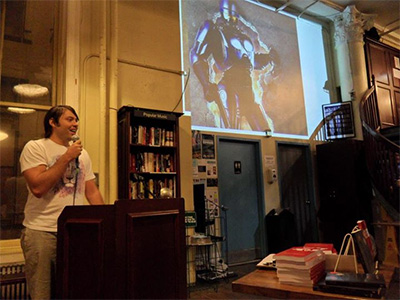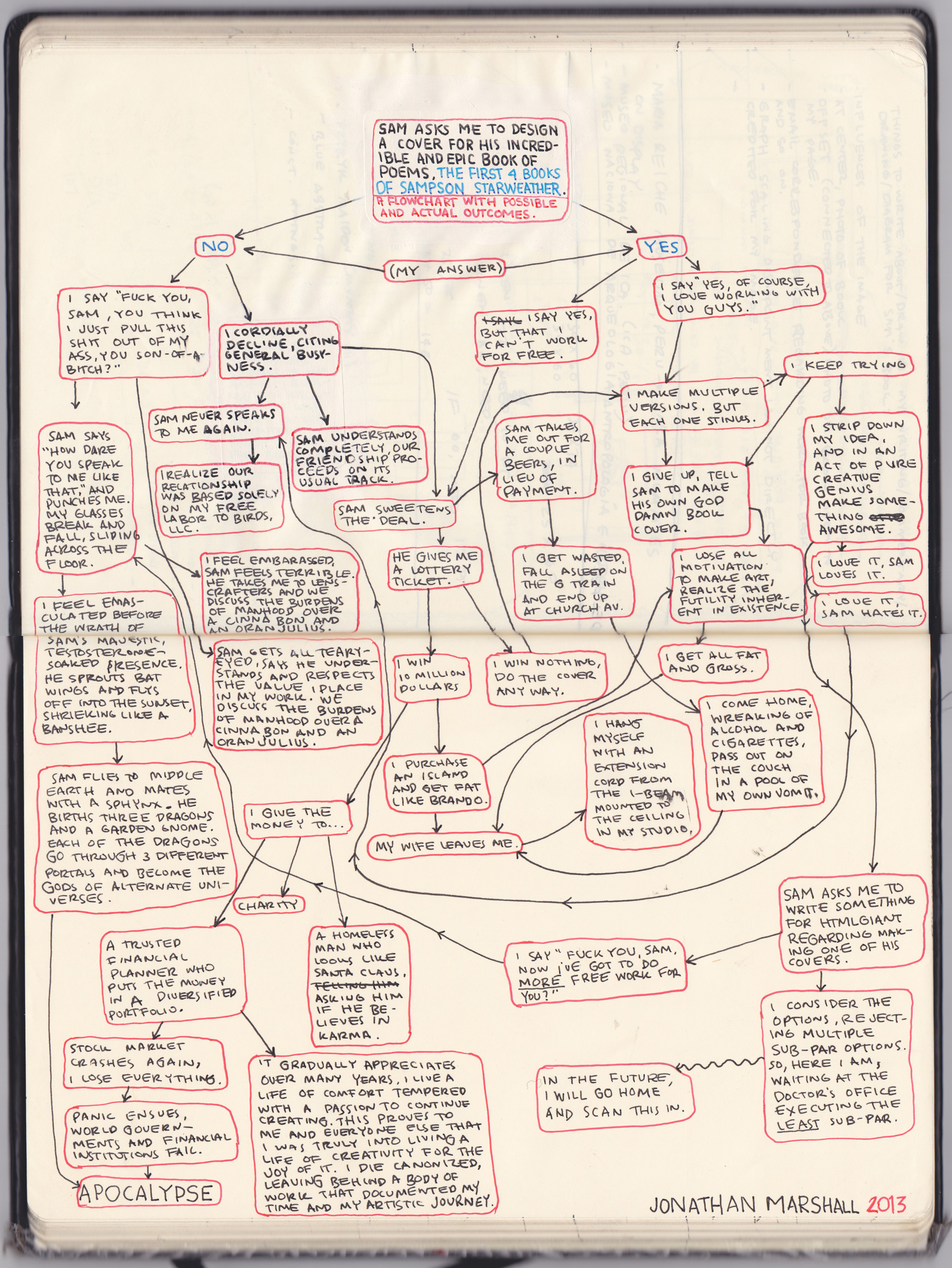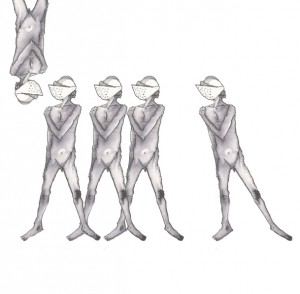
For Episode Lucky Seven of STARVING WEEK IT’S STARK STARVED OUT THERE WEAKLINGS, we feature poet mover and shaker Elisa Gabbert on The Waters, book three of The First Four Books of Sampson Starkweather. Read on as EG takes a delightful comb to Starkweather’s transcontemporatory faithfulness.
 If you don’t speak Spanish, here’s what you need to know about Cesar Vallejo’s Trilce: Clayton Eshleman does the best translations, and Sampson Starkweather does the best transcomtemporations. That’s what he calls them in “The Waters,” Book III of The First 4 Books of Sampson Starkweather – English-to-English translations that update the vocab and bric-a-brac of Vallejo’s originals for the life of an American man straddling the 20th and 21st centuries. In other words, “A transcontemporation is to a poem what RoboCop is to a normal police officer.”
If you don’t speak Spanish, here’s what you need to know about Cesar Vallejo’s Trilce: Clayton Eshleman does the best translations, and Sampson Starkweather does the best transcomtemporations. That’s what he calls them in “The Waters,” Book III of The First 4 Books of Sampson Starkweather – English-to-English translations that update the vocab and bric-a-brac of Vallejo’s originals for the life of an American man straddling the 20th and 21st centuries. In other words, “A transcontemporation is to a poem what RoboCop is to a normal police officer.”
You don’t have to read “The Waters” side by side with Trilce to enjoy it, but doing so makes Starkweather’s tricky, allusive, funny-sad poems extra-magical. Let’s take a look at “XIII” from Trilce, first in Vallejo’s original Spanish:
XIII
Pienso en tu sexo.
Simplificado el Corazon, pienso en tu sexo,
ante el hijar maduro del dia.
Palpo el boton de dicha, esta en sazon.
Y muere un sentimiento antiguo
degenerado en seso.
Pienso en tu sexo, surco mas prolific
y armonioso que el vientre de la Sombra,
aunque la Muerte concibe y pare
de Dios mismo.
Oh Conciencia,
pienso, si, en el broto libre
que goza donde quierre, donde puede.
Oh, escandalo de miel de los crepusculos.
Oh estruendo mudo.
Odumodneurtse!
Now here’s Eshleman’s translation:
XIII
I think about your sex.
My heart simplified, I think about your sex,
before the ripe daughterloin of day.
I touch the bud of joy, it is in season.
And an ancient sentiment dies
degenerated into brains.
I think about your sex, furrow more prolific
and harmonious than the belly of the Shadow,
though Death conceives and bears
from God himself.
Oh Conscience,
I am thinking, yes, about the free beast
who takes pleasure where he wants, where he can.
Oh, scandal of the honey of twilights.
Oh mute thunder.
Rednuhtetum!
 Every translation makes choices, but you can probably see, if you know even a little Spanish, that this is a faithful translation. The final line is the weirdest part of the poem—at first it looks like a nonsense word, then you realize “Odumodneurtse” contains the last two words of the penultimate line, backwards and jammed together to form a new word. Unfortunately, something is lost in Eshleman’s translation—his own nonsense word, “Rednuhtetum,” is “mute thunder” backwards, so the move comes across on a literal level. But in Spanish, the final “o” at the end of “mudo,” for “mute,” echoes the vocative/exclamatory “Oh” at the beginning of the previous two lines. Eshleman’s translated nonsense doesn’t have quite the same effect.
Every translation makes choices, but you can probably see, if you know even a little Spanish, that this is a faithful translation. The final line is the weirdest part of the poem—at first it looks like a nonsense word, then you realize “Odumodneurtse” contains the last two words of the penultimate line, backwards and jammed together to form a new word. Unfortunately, something is lost in Eshleman’s translation—his own nonsense word, “Rednuhtetum,” is “mute thunder” backwards, so the move comes across on a literal level. But in Spanish, the final “o” at the end of “mudo,” for “mute,” echoes the vocative/exclamatory “Oh” at the beginning of the previous two lines. Eshleman’s translated nonsense doesn’t have quite the same effect.
Starkweather’s version isn’t so faithful, especially when it comes to the last line:
XIII
I think of your sex.
With dumbed-down heart I think of your sex
as ants hijack the day’s blonde daughter.
Even the Pope gets the hiccups.
The cardinal fluttering against the glass:
phoenix, arrested.
I think of your sex, wave which knocks
out the breath, holds a body under, no way to say
which way is up. Death keeps feeding coins
into the meter of your mouth.
O, Consequence,
I am thinking too, about you, free animal
who takes pleasure where she wants, because she can.
O, honey of daughterless dusk.
O, hoarse voice of lightning.
Rudderowstarkweathersampson!
You’ll notice that the “transcontemporation” is derived from both the sound of the original lines as well as the meaning, so line three (“ante el hijar maduro del dia”) is a combination of straight translation (“before the ripe daughterloin of day”) and soundplay: ante becomes ants and hijar becomes hijack, but the day’s daughter comes from the “underpoem,” such as that exists, not the surface sounds. And yet, also, some of the poem is entirely new—“phoenix, arrested” seems to come from nowhere, or rather from Sampson’s degenerate brain entirely.
The last line is where you really see the exuberant beauty of Starkweather’s riffs. “Rudderowstarkweathersampson” isn’t anything spelled backwards – it’s his name rearranged. Rudderow (the poet’s middle name) seems to have been triggered by alliterative association with “Rednuhtetum,” Eshleman’s rendition of “mute thunder.” Though the literal meaning of “Odumodneurtse,” such as there is one, is lost in the Starkweather version, it retains that feeling of reveling in the evocative power of nonsense, of personalized Jabberwocky. (Later, in LXV, we learn that Rudderow is “a nonsense word made up by [his] mom.”) And – the really lovely part – Rudderow contains a syllabic “O.”
Then, of course, there are the metaphors both more subtle (I love “wave which knocks / out the breath, holds a body under, no way to say / which way is up” – though a wave of love is less strange than a prolific furrow) and more absurd (“Death keeps feeding coins / into the meter of your mouth”) than the original. Every poem in “The Waters” is like this, not a puzzle to figure out, but a little game full of meanings, as many as you want: “at the edge / of beauty, it quivers, it sings, it holds / no water.”
Elisa Gabbert is the author of The Self Unstable (forthcoming from Black Ocean in Fall 2013) and The French Exit (Birds LLC, 2010). Her poetry, prose, and collaborations have appeared widely in publications such as Boston Review, Colorado Review, Conduit, Denver Quarterly, Pleaides, and elsewhere. She is a founding member of the Denver Poets’ Theatre and blogs at http://thefrenchexit.blogspot.com/.


 I was honored (drinking) when Sampson asked me to draw the cover for Self Help Poems, so of course I said yesh of courth. After reading the manuscript, I could see why he asked me to draw this particular cover. The poems pull innocence and nostalgia through the streets of pop culture and childhood—and I think I draw like that. He offered me a few wonderful ideas and I pulled together the ones I loved. One of the ideas was the classic self help book cover, so I researched (Googled) what those look like.
I was honored (drinking) when Sampson asked me to draw the cover for Self Help Poems, so of course I said yesh of courth. After reading the manuscript, I could see why he asked me to draw this particular cover. The poems pull innocence and nostalgia through the streets of pop culture and childhood—and I think I draw like that. He offered me a few wonderful ideas and I pulled together the ones I loved. One of the ideas was the classic self help book cover, so I researched (Googled) what those look like.




 If you don’t speak Spanish, here’s what you need to know about Cesar Vallejo’s Trilce: Clayton Eshleman does the best translations, and Sampson Starkweather does the best transcomtemporations. That’s what he calls them in “The Waters,” Book III of The First 4 Books of Sampson Starkweather – English-to-English translations that update the vocab and bric-a-brac of Vallejo’s originals for the life of an American man straddling the 20th and 21st centuries. In other words, “A transcontemporation is to a poem what RoboCop is to a normal police officer.”
If you don’t speak Spanish, here’s what you need to know about Cesar Vallejo’s Trilce: Clayton Eshleman does the best translations, and Sampson Starkweather does the best transcomtemporations. That’s what he calls them in “The Waters,” Book III of The First 4 Books of Sampson Starkweather – English-to-English translations that update the vocab and bric-a-brac of Vallejo’s originals for the life of an American man straddling the 20th and 21st centuries. In other words, “A transcontemporation is to a poem what RoboCop is to a normal police officer.” Every translation makes choices, but you can probably see, if you know even a little Spanish, that this is a faithful translation. The final line is the weirdest part of the poem—at first it looks like a nonsense word, then you realize “Odumodneurtse” contains the last two words of the penultimate line, backwards and jammed together to form a new word. Unfortunately, something is lost in Eshleman’s translation—his own nonsense word, “Rednuhtetum,” is “mute thunder” backwards, so the move comes across on a literal level. But in Spanish, the final “o” at the end of “mudo,” for “mute,” echoes the vocative/exclamatory “Oh” at the beginning of the previous two lines. Eshleman’s translated nonsense doesn’t have quite the same effect.
Every translation makes choices, but you can probably see, if you know even a little Spanish, that this is a faithful translation. The final line is the weirdest part of the poem—at first it looks like a nonsense word, then you realize “Odumodneurtse” contains the last two words of the penultimate line, backwards and jammed together to form a new word. Unfortunately, something is lost in Eshleman’s translation—his own nonsense word, “Rednuhtetum,” is “mute thunder” backwards, so the move comes across on a literal level. But in Spanish, the final “o” at the end of “mudo,” for “mute,” echoes the vocative/exclamatory “Oh” at the beginning of the previous two lines. Eshleman’s translated nonsense doesn’t have quite the same effect. 1.) What was your experience working on the cover of LA LA LA?
1.) What was your experience working on the cover of LA LA LA?
 Joyce Carol Oates
Joyce Carol Oates
 1) What was your experience working with Sampson?
1) What was your experience working with Sampson?


 Sampson and I are close friends. I love every time I get to collaborate with him because he’s so goddamn energetic. He’s one of the most dedicated, hard working poets I’ve ever met. While it might feel sometimes like your opinion isn’t filtering through his buoyant, manic stream of awesomeness… it is. He listens and takes everything in. He has a very generous heart and he’s a fucking fabulous poet.
Sampson and I are close friends. I love every time I get to collaborate with him because he’s so goddamn energetic. He’s one of the most dedicated, hard working poets I’ve ever met. While it might feel sometimes like your opinion isn’t filtering through his buoyant, manic stream of awesomeness… it is. He listens and takes everything in. He has a very generous heart and he’s a fucking fabulous poet.

 But these lines don’t believe in themselves. Or do they? When Obama is elected, the poet is astounded because “it had nothing to do with politics or humanity or any of that shit, it was simply the fact that language did this.” Hope is the last word in the book, books. On the other hand:
But these lines don’t believe in themselves. Or do they? When Obama is elected, the poet is astounded because “it had nothing to do with politics or humanity or any of that shit, it was simply the fact that language did this.” Hope is the last word in the book, books. On the other hand:

 Sampson wrote to me early last December to ask if I would make a cover for his book. “I’m very busy,” I summarily replied but in less summary and more polite terms. Because of a new full-time teaching job and an impending solo exhibition, I felt there was no way I would possibly have the time to make a cover. The next email I received from him came like a sudden summer storm (particularly strange in the final week of a wintering semester) complete with simultaneous heavy raindrops and sunshine. He supplied approximately 43 ideas for the cover, including examples from the history of fantastic poetry covers. Here’s an example:
Sampson wrote to me early last December to ask if I would make a cover for his book. “I’m very busy,” I summarily replied but in less summary and more polite terms. Because of a new full-time teaching job and an impending solo exhibition, I felt there was no way I would possibly have the time to make a cover. The next email I received from him came like a sudden summer storm (particularly strange in the final week of a wintering semester) complete with simultaneous heavy raindrops and sunshine. He supplied approximately 43 ideas for the cover, including examples from the history of fantastic poetry covers. Here’s an example: A few days after the semester ended when I was in rural Illinois staying in the log cabin where my fiancé grew up, I found myself making numerous studies for the cover. It seemed that I was going to design the thing after all. Sampson, like his neck-brace wearing alter ego from the sectional cover of Self Help Poems, is impossible to say “no” to. Of course, I realized that I couldn’t possibly have let this chance go by. I felt too much of a kinship with his poetry. In my painting-collages, I grapple with a similar intersection between memories (possibly misremembered) and the present moment; between romantic hopefulness and a self-conscious criticality that withers nostalgia. Sampson puts it well in Self Help Poems:
A few days after the semester ended when I was in rural Illinois staying in the log cabin where my fiancé grew up, I found myself making numerous studies for the cover. It seemed that I was going to design the thing after all. Sampson, like his neck-brace wearing alter ego from the sectional cover of Self Help Poems, is impossible to say “no” to. Of course, I realized that I couldn’t possibly have let this chance go by. I felt too much of a kinship with his poetry. In my painting-collages, I grapple with a similar intersection between memories (possibly misremembered) and the present moment; between romantic hopefulness and a self-conscious criticality that withers nostalgia. Sampson puts it well in Self Help Poems:



 I had the idea that the coat of arms should spawn from the inner selves of the various personas in his books and arrived at the hobo-TV-fire, the well (Sampson’s idea), the butterfly, and the grabbable hammer mentioned above. We hoped that his cover would resemble an older generation of much coveted books, the sort grabbed hungrily and pressed to the chest in basement bookstores or, more likely, found wrapped in a banana leaf on the shore of a distant island, the same far-away shore where you might find yourself 300 years in the future founding a religion who worships that sacred number: 4.
I had the idea that the coat of arms should spawn from the inner selves of the various personas in his books and arrived at the hobo-TV-fire, the well (Sampson’s idea), the butterfly, and the grabbable hammer mentioned above. We hoped that his cover would resemble an older generation of much coveted books, the sort grabbed hungrily and pressed to the chest in basement bookstores or, more likely, found wrapped in a banana leaf on the shore of a distant island, the same far-away shore where you might find yourself 300 years in the future founding a religion who worships that sacred number: 4. WEEKS: A lot can kill you in a week. Even more can eat you at your weakness. A whole week of hair growth depends on, uh, genetics? Weeks contain a finite series of burritos and an infinite burrito of choices. Hoopla, regrets, collapses, dancing so hard you have to pour a cup of ice water on your dome, other times that feeling like you have to drag yourself so hard by your own collar your shirt might tear. Huge trucks at night carrying turned-off, unblinking versions of those normally blinking signs that say CONSTRUCTION AHEAD or SLOW LANE ENDS, except the signs are big so the trucks themselves say OVERSIZED LOAD and are blinking, themselves, even though their cargo’s dark. What I would like to do is nominate Sampson Starkweather to rewrite the entirety of America’s highway marginalia, to be the official roadside spokespoet for all of America’s restless feelings. I don’t have shit to do with those decisions, so what is happening instead is that this week will be Sampson Starkweather week here at HTMLGIANT, aka STARK WEEK.
WEEKS: A lot can kill you in a week. Even more can eat you at your weakness. A whole week of hair growth depends on, uh, genetics? Weeks contain a finite series of burritos and an infinite burrito of choices. Hoopla, regrets, collapses, dancing so hard you have to pour a cup of ice water on your dome, other times that feeling like you have to drag yourself so hard by your own collar your shirt might tear. Huge trucks at night carrying turned-off, unblinking versions of those normally blinking signs that say CONSTRUCTION AHEAD or SLOW LANE ENDS, except the signs are big so the trucks themselves say OVERSIZED LOAD and are blinking, themselves, even though their cargo’s dark. What I would like to do is nominate Sampson Starkweather to rewrite the entirety of America’s highway marginalia, to be the official roadside spokespoet for all of America’s restless feelings. I don’t have shit to do with those decisions, so what is happening instead is that this week will be Sampson Starkweather week here at HTMLGIANT, aka STARK WEEK.
 In the end it came down to precisely the opposite of your question: “Why not?” Why not 4 books in 1? Why not a 328 page monster poetry collection that sounds like a seminal lifetime work by some famous, award-winning, about-to-die poet who now tends a garden, published by some big-ass conglomerate press like Penguin, but is actually by some dude with a ridiculous name that no one has heard of (and sounds like a character from Game of Thrones) and has yet to publish a full-length book, on a small indie poetry press that, oh yeah, he just happens to be a publisher/founding-editor of? It seemed ridiculous, audacious, absurd, unheard of, taboo, laughable—in other words, perfect.
In the end it came down to precisely the opposite of your question: “Why not?” Why not 4 books in 1? Why not a 328 page monster poetry collection that sounds like a seminal lifetime work by some famous, award-winning, about-to-die poet who now tends a garden, published by some big-ass conglomerate press like Penguin, but is actually by some dude with a ridiculous name that no one has heard of (and sounds like a character from Game of Thrones) and has yet to publish a full-length book, on a small indie poetry press that, oh yeah, he just happens to be a publisher/founding-editor of? It seemed ridiculous, audacious, absurd, unheard of, taboo, laughable—in other words, perfect.